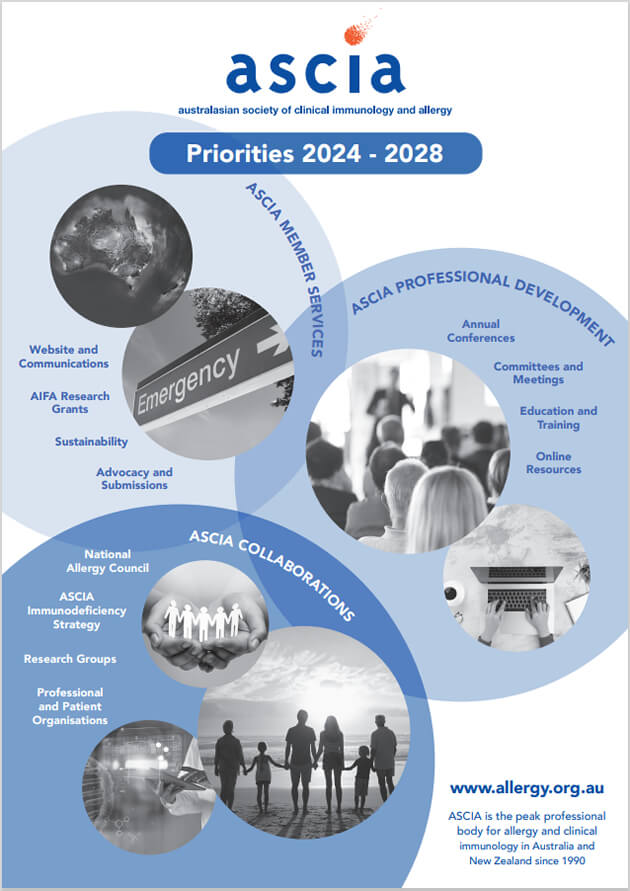ASCIA Priorities 2024-2028
ASCIA's purpose is to advance the science and practice of allergy and clinical immunology.
This is achieved by promoting the highest standard of medical practice, training, education and research, to improve the quality of life and health of people with immune system disorders, including allergies, immunodeficiencies and other immune diseases.
ASCIA works towards achieving its purpose by undertaking initiatives that are prioritised to maximise services and benefits to ASCIA members, whilst advocating for patients and carers. ASCIA priorities for 2024-2025 are listed below.
ASCIA MEMBER SERVICES
- Advocacy on behalf of ASCIA members – ASCIA makes regular submissions to government and other organisations through letters, submissions and reports.
- ASCIA online communications – Each month ASCIA informs members of new and updated allergy and immunology information, mainly via ASCIA e-newsletters and direct emails.
- Advertising of positions - This includes public hospital and private practice allergy/immunology consultant and other health professional positions.
- Listing on the ASCIA website ‘How to Locate a Specialist’ section – Full ASCIA members are eligible for one or more listings on the ASCIA website.
- AIFA research grants – Only ASCIA members are eligible to apply for Allergy and Immunology Foundation of Australasia (AIFA) research grants.
- ASCIA immunodeficiency online resources, education and training - ASCIA members have access to new and updated immunodeficiency information, resources and collaborations, including TAPID, the ASCIA Immunodeficiency Strategy and information for patients, carers and the community.
- ASCIA anaphylaxis/allergy online resources, education and training - To support ASCIA members, new and updated ASCIA online information about anaphylaxis and allergy is regularly developed and updated. These include ASCIA Action Plans for Anaphylaxis, ASCIA anaphylaxis e-training courses and information for patients, carers and the community.
- Access to ASCIA member only resources - These include ASCIA teaching slides and protocols for food or drug (medication) allergen challenges.
- Sustainability - ASCIA has been operating for more than 30 years, to provide services to ASCIA members and the community, whilst ensuring that ASCIA’s operations are financially viable and environmentally sustainable into the future.
ASCIA PROFESSIONAL DEVELOPMENT
- ASCIA Annual Conference – This is the main event for allergy and immunology continuing professional development (CPD) in Australia and New Zealand, which also enables important interactions with colleagues. ASCIA members receive discounted registration fees.
- ASCIA committees and working parties - These play a vital role within ASCIA. Membership is restricted to ASCIA members and participation is on a voluntary basis. Chairs of ASCIA committees are represented on ASCIA Council.
- ASCIA educational dinner meetings – Only ASCIA members are eligible to attend ASCIA educational dinner meetings, which contribute to CPD and enable interactions with colleagues.
- ASCIA online meetings - ASCIA Associate members (Advanced Trainees, Nurses and Dietitians) and TAPID members regularly meet by videoconference, which is facilitated by ASCIA and contributes to CPD.
- ASCIA advanced training meetings – Only ASCIA Associate (Trainee) members are eligible to attend ASCIA advanced training meetings, which are usually held each year.
The Medical Board of Australia and the Medical Council of New Zealand have strengthened recertification requirements for medical practitioners, who will each need a CPD Home from January 2023:
- RACP Fellows can access Information about the RACP MyCPD program here.
- RACGP Fellows can access information about the RACGP CPD program here.
- Rural and remote medical practitioners can access information from ACCRM here.
ASCIA COLLABORATIONS
- National Allergy Council – This partnership between ASCIA and Allergy & Anaphylaxis implements the National Allergy Strategy by advocating and developing resources that include Nip allergies in the Bub and Allergy 250K.
- ASCIA Immunodeficiency Strategy – This collaboration between ASCIA, patient support organisations and other stakeholders aims to improve the health and well-being of people with immunodeficiencies. Implementation of the Strategy commenced in 2022, with an initial focus on newborn screening for severe combined immunodeficiency (SCID).
- Collaborations with research groups – ASCIA collaborates with research groups such as the Centre for Food & Allergy Research (CFAR), the National Allergy Centre of Excellence (NACE) and the Clinical Immunogenomics Research Consortium Australasia (CIRCA).
- Collaborations with patient/carer support groups - Each year ASCIA invites up to ten patient/carer support groups to exhibit at the ASCIA Annual Conference.
- Communications with other professional organisations.

![]() ASCIA Priorities 2024-2028742.37 KB
ASCIA Priorities 2024-2028742.37 KB
Webpage updated December 2024
